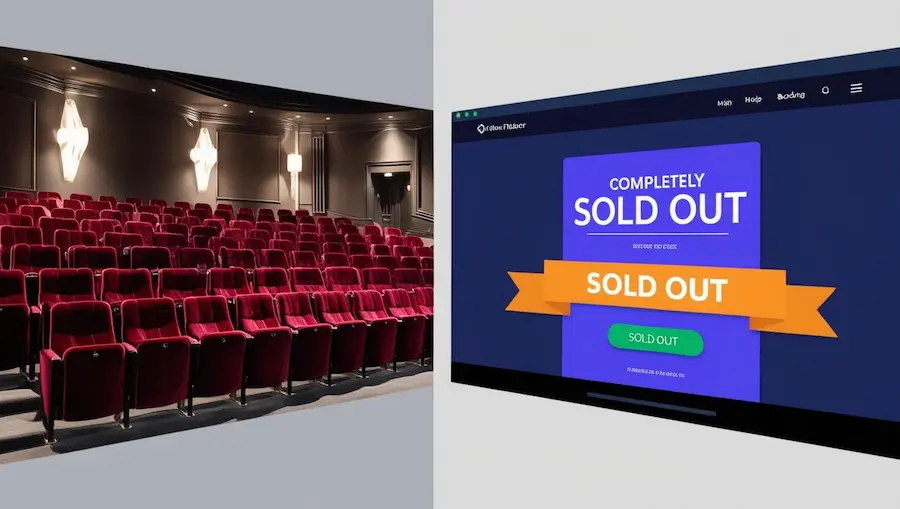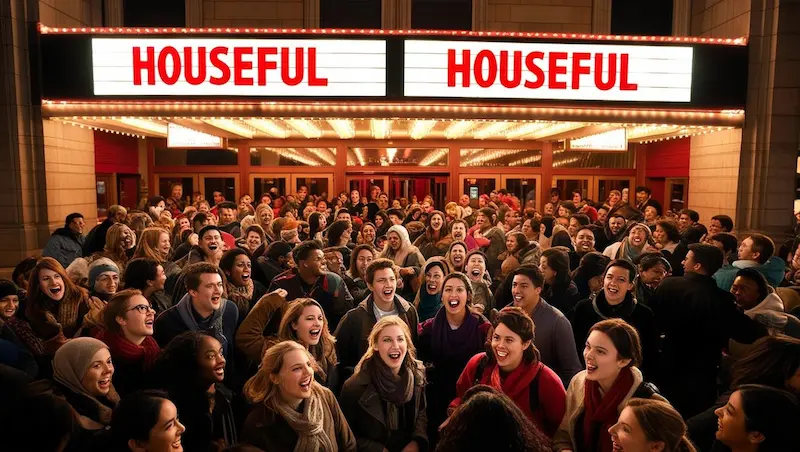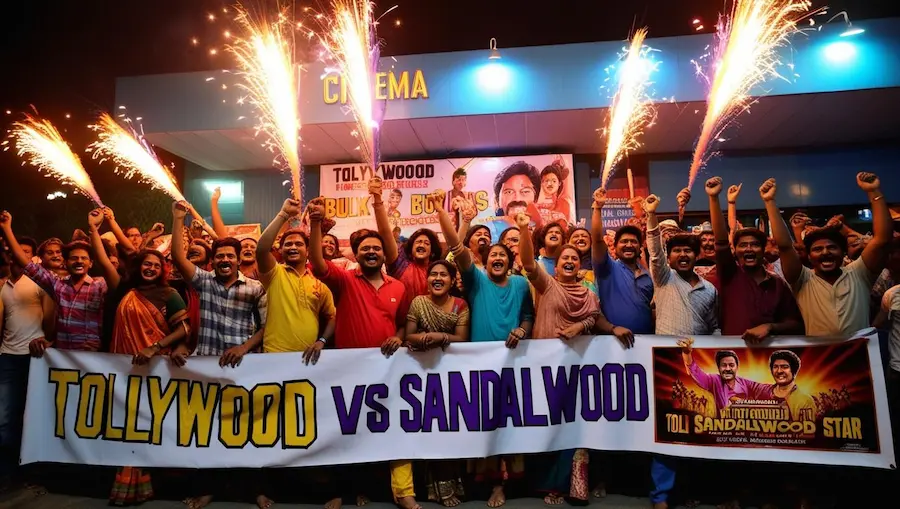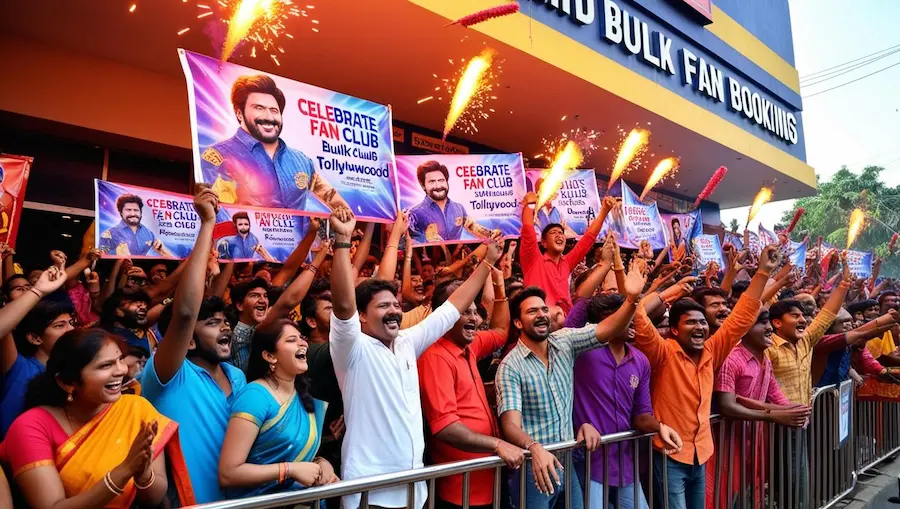
Ever wondered how some films rake in “record-breaking” collections on opening weekends, even when theaters seem half-empty? The truth might surprise you—it’s not always the audience driving those numbers.
In the glitzy world of cinema, where perception is everything, box office numbers can make or break a film’s reputation. But what if those jaw-dropping figures aren’t entirely organic? From Bollywood’s corporate-backed ticket buys to Tollywood’s fan-fueled frenzy and Sandalwood’s strategic hype-building, the practice of bulk bookings has quietly reshaped the way films are marketed and consumed. Let’s dive into this fascinating trend, uncovering how it started, who’s behind it, and why it’s become a game-changer for the Indian film industry.
The trend of bulk bookings in Hindi films, often referred to as “block bookings” or “corporate bookings,” involves producers, stars, or associated brands purchasing large numbers of tickets for their own films. This practice is primarily aimed at inflating box office numbers, creating a perception of success, and boosting a film’s marketability for streaming and satellite deals.
Who Buys Tickets in Bulk?
- Producers and Studios: They often allocate a portion of the film’s budget to buy tickets, especially during the opening weekend, to inflate collections.
- Actors and Their Teams: Stars sometimes encourage their affiliated brands or fan clubs to purchase tickets in bulk as part of promotional strategies.
- Corporate Brands: Companies associated with the film or its stars buy tickets as part of endorsement deals. These tickets are sometimes distributed to employees or used in promotional campaigns.
- Educational Institutions or Groups: In some cases, tickets are distributed to schools, colleges, or other groups to fill seats and create an illusion of demand.
When Did It Start?
The practice isn’t entirely new. According to trade analysts, it dates back to the 1970s and 1980s, when it was known as “feeding.” Back then, producers or stars would buy tickets at select theaters to ensure “houseful” boards, creating hype around the film. However, the scale of block bookings has grown significantly in recent years, particularly post-2019, as the industry faced challenges like the pandemic and competition from South Indian films.

Why Has It Grown Recently?
- Post-Pandemic Recovery: After the COVID-19 pandemic, the Hindi film industry struggled to bring audiences back to theaters. Bulk bookings became a way to project a film as a hit, even if actual footfalls were low.
- OTT and Satellite Deals: Inflated box office numbers help producers negotiate better deals with streaming platforms and TV networks.
- Perception Management: A strong opening weekend collection creates buzz and can influence audience behavior, encouraging more organic ticket sales.
Impact on the Industry
While bulk bookings can temporarily boost a film’s numbers, they often backfire if the film fails to meet audience expectations. Empty theaters despite “houseful” bookings damage credibility, and word-of-mouth can quickly sink a poorly received film. Critics and trade analysts have increasingly called out this practice, labeling it harmful to the industry’s long-term health.
How Does Regional Indian Cinema Fare?
The Kannada and Telugu film industries, like other Indian regional film industries, have also seen instances of bulk ticket bookings, but the dynamics differ slightly from Bollywood. Both industries have experienced significant growth in recent years, especially with the rise of pan-Indian films, and bulk bookings have become a tool for creating hype and ensuring strong openings.

Kannada Film Industry
The Kannada film industry, also known as Sandalwood, has gained national and international attention in recent years, especially with the success of films like KGF: Chapter 1 and KGF: Chapter 2. Bulk bookings in this industry are not as widespread as in Bollywood, but they do occur, particularly for high-profile films.
- Fan Clubs: Kannada stars like Yash, Puneeth Rajkumar, and Sudeep have massive fan followings. Fan clubs often organize bulk bookings to show their support, especially during the first few days of release. This creates a perception of high demand and helps generate buzz.
- Producers and Distributors: For big-budget films, producers or distributors may buy tickets in bulk to ensure strong opening weekend numbers, especially in key markets like Bengaluru and Mysuru.
- Corporate and Community Screenings: Occasionally, companies or local organizations book entire theaters for screenings, particularly for films with cultural or regional significance.
The KGF franchise, for instance, saw a mix of organic demand and strategic bulk bookings to ensure packed theaters during its opening weekend, which helped it gain momentum across India.
Telugu Film Industry
The Telugu film industry, or Tollywood, is one of the largest and most commercially successful film industries in India. Bulk bookings are more common here, especially for big-budget, star-driven films.
- Fan-Driven Culture: Tollywood has a deeply entrenched fan culture, with stars like Prabhas, Mahesh Babu, Allu Arjun, and Jr. NTR commanding massive loyalty. Fan clubs often organize bulk bookings for the first day or first weekend to celebrate their favorite stars. These events are often accompanied by celebrations like processions, firecrackers, and special screenings.
- Producers and Distributors: For high-profile films, producers and distributors sometimes buy tickets in bulk to inflate opening weekend numbers. This is especially true for pan-Indian films like Baahubali, RRR, and Pushpa, where the stakes are high, and a strong opening is crucial for nationwide success.
- Corporate and Political Connections: In some cases, corporate sponsors or even political groups may book tickets in bulk to support a film, especially if it features a star with political aspirations or connections.
- Regional Pride: Telugu audiences are known for their strong regional pride. For films that showcase Telugu culture or are directed by prominent filmmakers, community groups or organizations may book tickets in bulk to support the industry.

Why Bulk Bookings Are Common in These Industries
- Fan Culture: Both Kannada and Telugu industries have a strong fan-driven culture, where fans see it as their responsibility to ensure their favorite star’s film succeeds.
- Pan-Indian Aspirations: With the rise of pan-Indian films, especially from the Telugu industry, there is immense pressure to deliver massive opening weekend numbers to compete with Bollywood and other regional industries.
- Hype and Perception: Like Bollywood, the perception of a “blockbuster” opening is crucial for a film’s success. Bulk bookings help create the illusion of packed theaters and strong demand, which can influence undecided audiences.
- Social Media Buzz: Bulk bookings often lead to viral social media posts showing “houseful” boards and celebrations, which further amplify the hype.
Recent Examples
- Kannada Films: KGF: Chapter 2 saw massive fan-driven bulk bookings, especially in Karnataka, which helped it break records across India. Similarly, Kantara gained momentum through organic word-of-mouth but also saw some strategic bookings in its early days.
- Telugu Films: RRR and Pushpa: The Rise both benefited from fan-driven bulk bookings, especially in Andhra Pradesh and Telangana. These films also saw corporate-sponsored screenings and strategic ticket purchases to ensure strong openings.
In summary, bulk bookings are more common in the Telugu industry due to its larger scale and deeply entrenched fan culture, while the Kannada industry sees it primarily for big-budget or star-driven films. Both industries use this strategy to create hype, but the Telugu industry has taken it to a whole new level, especially with its pan-Indian ambitions.

What’s the trend across the borders?
Bulk ticket bookings, while prominent in Indian cinema, are not as widespread or openly practiced in Hollywood or European cinema. However, there are some parallels and unique practices in these regions:
Hollywood
In Hollywood, bulk ticket purchases are not a common strategy to inflate box office numbers. The U.S. box office relies heavily on organic audience turnout, driven by marketing, reviews, and word-of-mouth. However, there are instances where:
- Corporate Buyouts: Companies or organizations may purchase large blocks of tickets for employee perks, promotional events, or charity screenings. For example, Marvel or Disney films often see corporate-sponsored screenings.
- Fan Events: Studios sometimes organize fan events or early screenings, where tickets are pre-purchased and distributed to create buzz.
- Church or Community Groups: Faith-based films like The Passion of the Christ or Jesus Revolution have seen bulk bookings by religious organizations to support the film’s message.
Hollywood’s focus is more on long-term box office performance and ancillary revenue streams (like streaming and merchandise) rather than artificially inflating opening weekend numbers.
European Cinema
In Europe, the practice of bulk bookings is even less common. The cinema culture here is more focused on smaller, independent films and arthouse productions, which rely on critical acclaim and festival circuits for success. However:
- Cultural or Educational Screenings: Schools, universities, or cultural organizations may book entire theaters for specific films, especially those with historical or educational significance.
- Government or Institutional Support: In countries like France, where cinema is heavily subsidized, there might be initiatives to promote domestic films through group screenings or partnerships with institutions.
Why the Difference?
- Transparency and Regulation: Hollywood and European cinema markets are more regulated, with stricter oversight of box office reporting. Inflating numbers through bulk bookings could lead to reputational damage.
- Audience Behavior: Western audiences are less likely to be influenced by “houseful” signs or opening weekend hype. They rely more on reviews, trailers, and personal interest.
- Market Dynamics: The focus in these markets is often on long-term profitability, including streaming, international sales, and awards recognition, rather than just opening weekend numbers.
In short, while bulk bookings do happen in Hollywood and European cinema, they are typically for legitimate purposes like corporate events or community screenings, rather than as a strategy to manipulate box office figures. The cultural and regulatory differences make this practice far less prevalent compared to Indian cinema.



